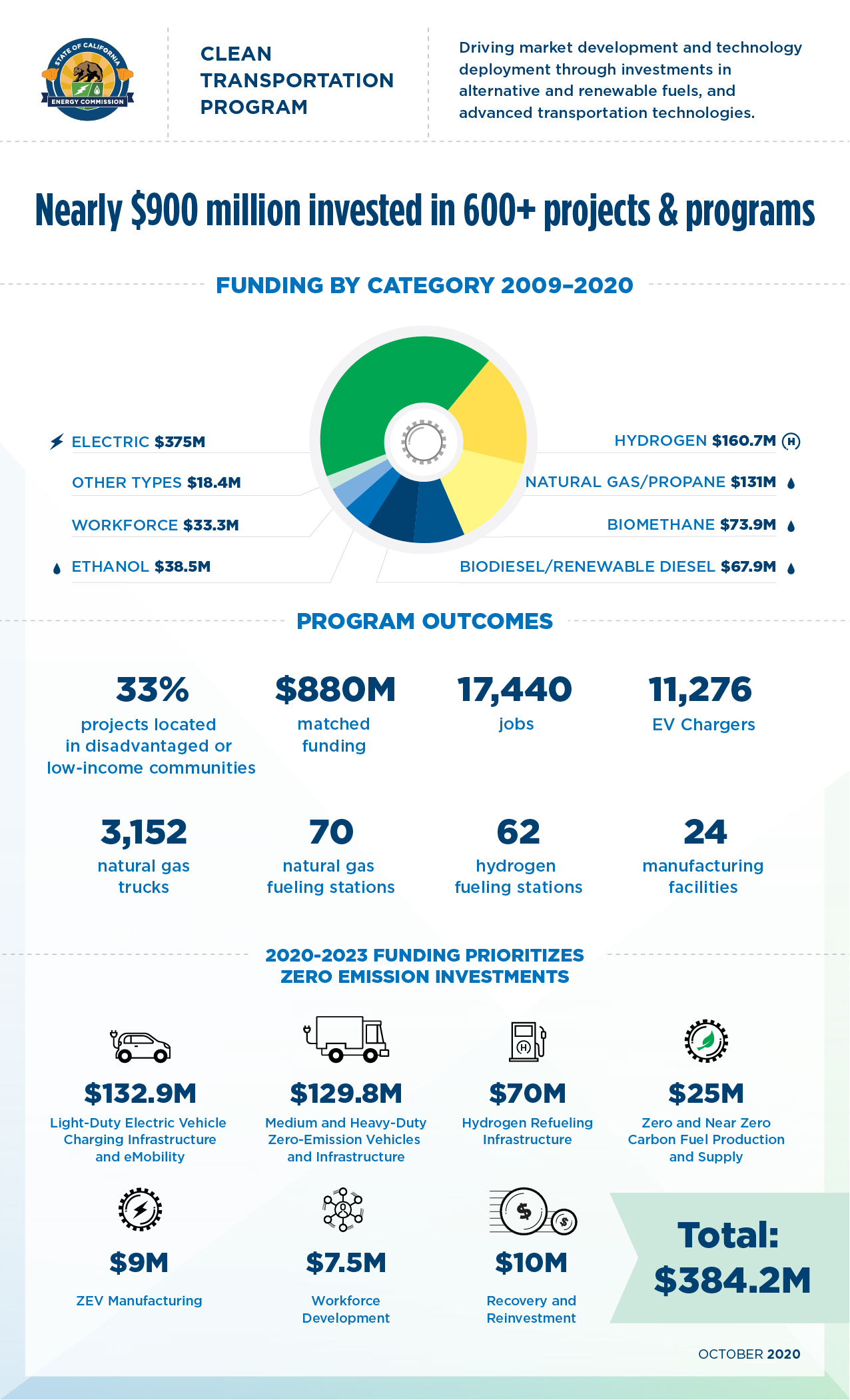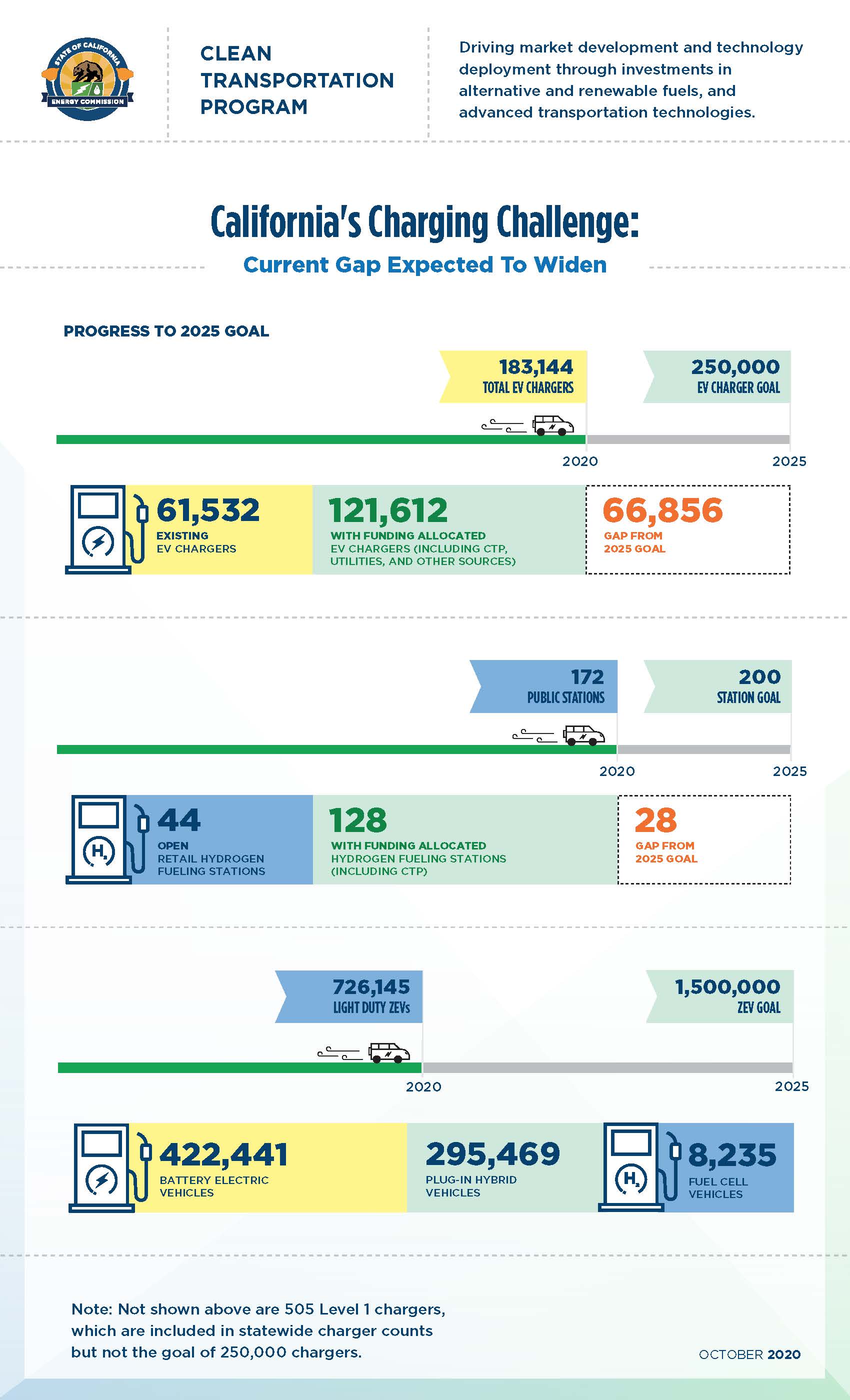For Immediate Release: October 14, 2020
Plan fills gaps in California’s electric vehicle charging network, aims to invest 50 percent of funds to benefit disadvantaged communities
SACRAMENTO – The California Energy Commission (CEC) today approved a $384 million plan for critical clean transportation investments to boost the adoption of zero-emission cars and trucks and help the state reach its climate, clean energy and public health goals. The plan focuses on closing gaps in zero-emission fuels and infrastructure to support Governor Gavin Newsom’s executive order phasing out the sale of new gasoline-powered passenger vehicles by 2035.
“The zero-emission transportation market continues to be California’s for the making, delivering jobs and cleaner air especially in communities most in need of relief,” said lead commissioner for transportation Patty Monahan. “This funding plan is another down payment on electrifying transportation while helping ensure everyone can take part through access to convenient refueling, innovative mobility options, workforce training programs and more.”
The 2020-2023 Investment Plan Update for the CEC’s Clean Transportation Program (formerly known as the Alternative and Renewable Fuel and Vehicle Technology Program) prioritizes funding for zero-emission vehicle (ZEV) infrastructure, related workforce development and manufacturing.
The plan approved today includes:
- $132.9 million for light-duty EV charging infrastructure.
- $129.8 million for medium- and heavy-duty ZEVs and infrastructure.
- $70 million for hydrogen refueling infrastructure.
- $25 million for zero-and near-zero-carbon fuel production and supply.
- $10 million for recovery and reinvestment.
- $9 million for ZEV manufacturing.
- $7.5 million for workforce development.
The funds will become available over the next three years and will be distributed to projects through a mix of competitive funding solicitations and direct funding agreements. The plan was guided by input from newly appointed members of the Clean Transportation Program Advisory Committee, reflecting a broad array of stakeholders representing community-based organizations, social and environmental justice advocates, alternative vehicle technologies, as well as workforce and labor interests.
Investments reflect market potential and technological need and are designed to complement other state programs and policies. In response to engagement with the program advisory committee and the Disadvantaged Communities Advisory Group, the CEC will seek to provide 50 percent of funds from this plan to projects that benefit low-income and disadvantaged communities. Staff will also explore quantifying benefits in new ways that go beyond measuring funding amounts within a given location, to ensure the dollars meaningfully advance equity within the state.
A new category for recovery and investment allocates $10 million to address near-term needs of projects impacted by the economic fallout from COVID-19, including creating opportunities for program funding to be leveraged for federal cost-sharing.
Created by Assembly Bill 118 (Núñez) in 2007 and reauthorized by Assembly Bill 8 (Perea, 2013), the Clean Transportation Program is one of the first transportation-focused funding efforts established to help advance the state’s climate change policies. Now in its 12th year, the program has provided nearly $900 million to projects across the state covering a broad spectrum of alternative fuels and technologies.
Related Links:
- Clean Transportation Program
- 2020-2023 Investment Plan Update for the Clean Transportation Program
- Zero-Emission Vehicle and Charger Statistics Dashboard
Download Clean Transportation Program - PDF
Download Charging Challenge - PDF
###
About the California Energy Commission
The California Energy Commission is leading the state to a 100 percent clean energy future. It has seven core responsibilities: developing renewable energy, transforming transportation, increasing energy efficiency, investing in energy innovation, advancing state energy policy, certifying thermal power plants, and preparing for energy emergencies.


